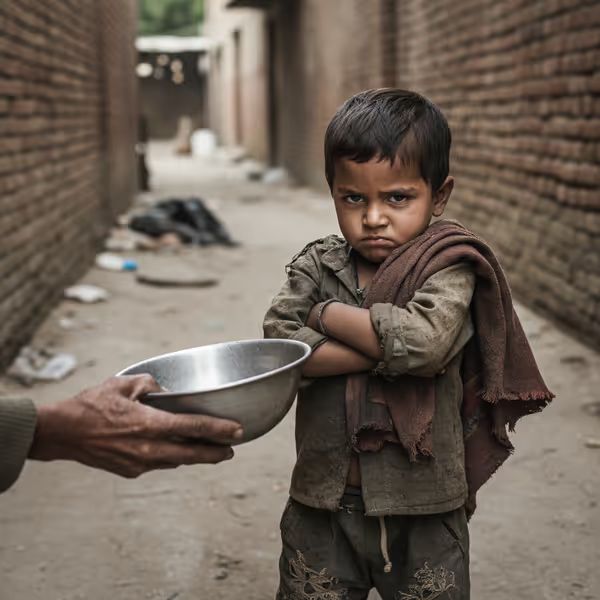Nobody left behind

It really isn't complicated
The story we are told
- There aren't enough resources to go around and look after everybody's needs.
- Because of this: people can't get what they need to survive and thrive
- Some people will have more because it's meant to be that way.
- You have to fight to make sure you have enough.
- Other people (migrants or the disabled or pick anyone that isn't you) are stopping you having enough.
- Even if you want things to be better you've been told that there is no alternative to being impoverished and living in a world that gets shittier every day. The blessed millennials subject to so much silly abuse by people who should know better can see this, they know that the world that they're going to inherit and the world that the people coming after them are going to inherit, is pretty doomed.
The truth
- We live under the capitalist system.
- It has created the most productive and powerful technology ever devised for making the things people need. But the system of manufacturing and so on is unrelated to who owns it and we have to be careful not to credit capitalism itself with this.
- This system is built on our backs, by centuries of labour by people just like us, but it's all skewed because a very small number of people own what we make.
- Capital itself must grow to continue existing, this means capitalists must compete with each other in a senseless drive to make profit. They try to make profit from everything, which is why the necessities of life like food and water and decent housing are really badly served for a lot of people. It's also why things like health services are now being used to make profit, because they've run out of things they can easily use so instead profiteering from illness or access to water is becoming a thing they must do in order to keep on with the madness.
- Over time, the competition between capitalists means that there are less and less of them as markets consolidate and monopolies are formed. There can be no good outcome from this because the social weight of all that property and wealth means that their needs, or more properly the needs of capital itself, are put before everybody else's. We still have this stupid mediaeval hangover where we live the way things were done under the royalty of old, where you were owned, except now you are free to starve if you can’t or won’t make money for them. Instead of people our owners now own things. We have rights, for sure, but you need wealth and privilege to exercise them. We still live in a world where privilege of wealth counts more than common humanity.
- In Britain we have the weird phenomenon where your distant ancestors helping some old king in the battle of 1066 means that you still have vast wealth. The rest of us have never really figured. We fought for what we have, whether it was with unions, or taking on the bosses in places like Parliament. They would never have given us a thing if they could've got away with it.
- Despite these obvious flaws in the idea of markets and competition our owners keep pushing it as the only solution to the problems that we all face. They don't have any clue about what is actually needed to make things better. They keep presenting the same old rubbish over and over again, even though we all know it no longer works and never did very well, because they have no answers. If we carry on the way we are nothing will work properly and things will start to fail.
- Because the whole thing is so obviously stupid they spend trillions keeping us convinced that things can’t change so they won’t. They own the media, they pay for the publication of the books, they pay for teams of educators to promote their ideas, they label people who want a better world as dangerous.
What we need
Instead of society based on profit, and a slavish subservience to the needs of a very few whose only redeeming feature is their ancestors may have had slightly sharper swords than the rest of us, or were just luckier, we need a society that's based on understanding people’s needs. We need a society where no one is left behind. Then there is no need to fight, there's no need to get angry because somebody is getting what they need and you feel you are not. If everybody does then conflict just washes away.
This is the basis of socialism. It's not hard to understand. We live in a world where is more than enough for everyone, but a tiny number of people are holding onto all the resources while the vast majority are left fighting over the scraps from the rich people's table. They sell this to us by telling us that there is a terrible scarcity of things, and therefore they can't be enough to go round. This means that we have to fight with each other and keep other people away from taking what's ours. They have created a land of the closed fist when we need an open hand. This is why the green plenty logo is an open hand.
The current system works very well for the people who already have far more than they will ever need, it's death sentence for the rest of us, especially in the Global South. Those resources need to be taken back by the people that actually create them. Then we can have a society when no one is left behind. An example I cite often is food - we make enough food for 2½ billion more people than actually exist but we still have poverty and starvation because feeding the starving doesn't make a profit.
Humans share a common set of needs, and we can meet them if we want to. You don't need to be angry with your neighbour, or someone with a different coloured skin who also happens to come from somewhere else in the world. You don't need to listen to the idiot telling you that those folks have caused the problems that you face. The people sitting on the vast pile of resources who don't even know you exist are the problem. They are parasites and they are completely unaware of what they're doing to the rest of us, or of they are they don't care.
So it's important not to hate the rich, but more the idea that people can be rich at someone else's expense. The great hero of neoliberal thinking, Hayek, almost got this in some of his writings. He said that giving things to one group in society might create resentment in another. But of course the idea that one might create a society where everybody has what they need, so you're not giving things, instead every human being has what they need to survive and thrive because it's part of their human heritage, would never have occurred to him. He was one of the forerunners creating the now normal neoliberal self centred mind soup we are forced to endure as late stage capitalism eats itself and everything else.
Once nobody shall be left behind is established as a principle, when everybody gets what they need, and a little more for comfort, there’s no longer a requirement to hold onto things with a death grip and discriminate against others. The false idea of overwhelming scarcity means our society is built on an unnecessary and hurtful desperation. Fear makes people stupid and shuts down thinking. False scarcity is damaging our minds.
Human needs
In brief we have these needs:
- Food autonomy
- Shelter autonomy
- Education autonomy
- Healthcare autonomy
- Contingency
- Personal
- Group
- Mobility
The word autonomy appears a lot there. It does so for a reason. If you can feed, shelter, educate and look after yourself without someone else being able to take those things from you then you are properly free.
Dignity is the watchword. If you have dignity, and nobody has a hold over you, then you can be what you need to be. We live in a world where we’re all mentally stunted, even the very wealthy who appear to have everything are stunted because they don’t understand how the world works or their place in it. When the world is remade either as socialism or barbarism its remaking will change us too.
Anger
Many of us are deeply angry underneath the imposed individualism and despair. Vast wealth is built on leaving people behind, on making them suffer more. You’d have to have a heart of stone if the prancing and prating of the idiot savant billionaire class didn’t fill you with fury. Their recent AI fever is wasting huge resources and our bought political class fall over themselves to offer them tax breaks, cheap electricity etm. while ignoring environmental damage that’s killing people while we pay for the subsidies so the clowns can play with their expensive toys.
It all needs to be swept away and nobody can do this on their own. The dystopian stories, like Kantis leading a revolution in The Hunger Games, are written through the eyes of one individual. There's an idealist, magical trope hidden in them, but real change comes from enough of us demanding it. Sure, individuals can lead or set an example, but wider change comes from all of us. Share that anger and let it grow into hope.
They are us
We're told that there is a them, immigrants, gays, disabled people, trans people. Psychologists call this othering. It's one of the first stages of dehumanising people that's used to prepare for doing evil things to them. We must always remember they are us. Immigrants or whoever they're telling you to hate this week are just people. Just like us. We have far more in common with them than a ketamine fuelled billionaire who can't tell the truth about their self driving cars.
Love
I have had discussions with people many times about the word respect. It comes from the same root as spectacle, in essence you are looking at others and judging them worthy. If you chose you could withdraw your respect and suddenly we're in a bad place fighting each other again. A world built on needs instead operates using the words accept and love. Unconditional love cannot be withdrawn by definition. Making sure we all have what we need and it will always be there is unconditional love and acceptance. It's a completely different approach to organising things. It’s fundamental if you want to create a society built around needs, rather than the paltry wants of a parasitic few who think they own things.
I also have problems with words like empowerment, when it’s something that’s given rather than taken or even just part of the way people work. If something is given by the more powerful, then it can be taken away by them again just as easily. This is one of the fundamental things about the society we live in now, everything is conditional even though people don’t realise it. Laws are enforced because it’s worth their while enforcing them. They often pass laws to give themselves legitimacy when they want to stamp on us. They’ve never needed to do so. For example, those of us old enough to remember the miners’ strike in the 1980s can remember that certain roads suddenly became roads you couldn’t drive down if you were a miner. If they want to the authorities can just make it up as they go along. Empowering yourself by taking control of what’s yours is a completely different thing, however.
Legality and demanding peaceful protest is one of the ways they keep us quiet. You’re not obliged to do what they tell you, as long as you’re willing to face the consequences of them turning on you.
Instead of respect or empowerment from above we have love and acceptance. These cannot be withdrawn, and are not conditional. It doesn't mean be nice to fascists, it there are still limits and boundaries.
Another summer of love
In the Global North the 1970s saw the smashing of trade unions and the painfully slow demise of the welfare state, piece by piece. This is when the lying propaganda about scroungers started to be heard, when the fear of powerful unions was given a full throated roar by the media. Our ruling class are very good at divide and rule, with all their experience of setting colonial peoples against each other and they played us like an old fiddle, with the decaying dreams of empire giving a rose tinted spectacle to distract and confuse.
It's so long ago that people can't remember what life was like then, even those of us who were teenagers in the 70s can't really think that far back. The late Mark Fisher talked about the summer of love (1967) in his work Acid Communism. Unfortunately, poor Mark died before he wrote the book and we only have the introduction to read. One of the points he makes is that the neoliberal smashing up of our rights as workers was only part of what they were doing. Their goal was also ideological, an Orwellian project to make even thinking of a better world almost impossible. Hence such nonsense as there is no alternative.
Underlying this was undoing the idea of a better society where people work together, which is what came out of the summer of love. The idea of acid communism is refinding that sense of solidarity, community and collaboration, of building a new consciousness, a class consciousness, that allows us to move away from the neoliberal hellscape. Now years later where our hopes are eaten by grubby algorithms we can see the hellscape's final fruit but we don’t have to accept the decay as given. Neoliberalism is all about the primacy of the isolated individual, a tiny mere consumer that can vote with their wallet and little else. Once we are divided, once we don’t have networks of mutual support and care, we’re easy pickings for the death machine.
There's an as yet unpublished talk I did on Acid Communism that I quote from here:
If all we have is capitalist collapse to look forward to, then that's it. We're done. Whereas Fisher believed that a better world is necessary and possible. The other point here is the status quo is not the status quo. The apparent status quo is its exact opposite because society is falling apart. To do nothing is to fail by default.
Instead, what we need is a convergence of countercultures. He talks about the feminist movement, the acid counterculture of the hippies, and the anti-capitalist movements, saying that they need to reconverge and create a new class consciousness.
What we need to free is in fact post-capitalist desire, as in the desire for something better, a world which isn't a place where everybody has to work, a world which is is not dominated by work giving humans value.
The goal of anti-capitalism is that there are no more markets and we are not commodities. We actually have value as human beings. One of the other key ideas in the introduction is collective thinking. No one is left behind, and everyone's needs are met.
Instead you have a world where there isn't scarcity because everyone has everything they need. So you have instead the cornucopia that is our birthright as human beings.
We have the technology to build it right now. Neoliberalism's goal was to convince us that there is no alternative. We've had it hidden from us by lies about scarcity and war.
He talks about potentiality, where we can actually think about a spectre of a new world, which could be free. Spectre is taken from Marcuse and he's playing here on the spectre of communism haunting Europe that Marx and Engels talk about in the Communist Manifesto, and the need to recover the utopian imagination.
We need to actually believe the better world is possible, and believe that we can do it, believe that things can be better. We need to throw away, we need to turn away, from the negativity and despair that's been placed in our heads by neoliberalism.
We need to recover our humanity and our connection with each other by working on how to work together. They are us and we are they. If all needs are met there is no need for conflict, instead perfect grounds for love and understanding.
The main thing neoliberalism has stolen from us is time. We've been given all these clever devices that steal our souls and keep us from thinking. They steal our lives from us, making it hard to do anything to effect change. If only people cared as much about our beautiful world as they did about football, for example.
If you list listen to a song like Aquarius it might sound trite now. Instead hear the enthusiasm, the love, the warmth. We can get that back if we want to and we should. The optimism of those days was infectious. You don't have to take on the hippy sentiments in the song to agree that a better world is not only possible but necessary. We stood on the edge of it happening and it was dashed from our hands.
As I wrote the case for Green Plenty back in 2021 - we really do have nothing to lose:
So they generously allow you food that doesn't feed you, clothes that don't clothe you, education that leaves you ignorant, and that’s just three examples of the ridiculous situation we find ourselves in. We have houses that don’t keep the rain out, we have shoes that let the rain in, the list is endless. Their profits are preserved and the cost of keeping you alive, at least for now, is low enough for that minimum wage job not to seem impossible.
Caring counts
The most dangerous thing you can be is someone who cares. Someone who is willing to put themselves out for others. Someone who isn’t driven by some kind of weird tit for tat selfish motivations. The opposite of the cliché tiger mom, someone who wants to work for everybody, without exception, fear or favour, not just her own kids’ interests.
This is why they mock us, why they talk about virtue signalling and so on. They don’t want us working together and try to tarnish and cheapen our motivations. It’s why they’re full of shit. If you are held up for ridicule it means you’re doing something right.
We literally have nothing to lose
If nothing is done the coming ecocide will destroy the industrial society we live in now. Humans may survive, or they may poison the tiny plankton that make most of the oxygen in the sea and there will be a massive die off that includes them. There may be some dystopian future where we use the remaining fossil fuels to crack oxygen out of the air so the privileged few who are left can carry on existing.
One of the arguments against Green Plenty being made real is that it will cost too much. If we're going to lose everything how much is too much? Instead the narrow interests of a few are putting the rest of us a serious risk. We have nothing to lose and a world to gain, a beautiful world where nobody is left behind.
Are you in?
Note: I have been a member of the Green Party for quite a while. Our new leader Zack Polanski said that he wants a world where nobody is left behind.
Again, are you in?




